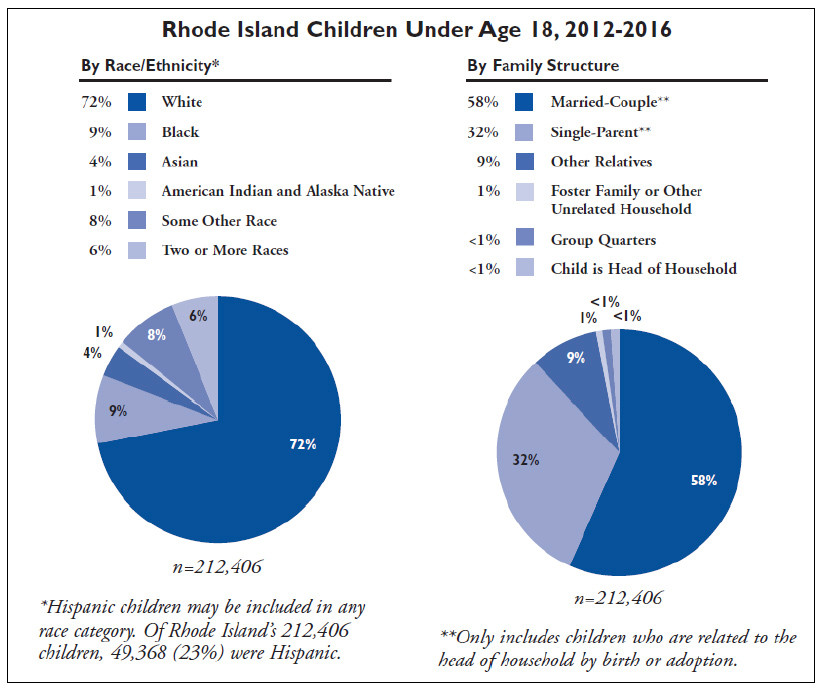What gets measured, gets done
Celebrating 24 years of advocacy based upon evidence-based data
WARWICK – The release of the 24th annual Rhode Island Kids Count Factbook on Monday, April 9, at the Crowne Plaza, is an important rite of spring in Rhode Island, celebrating children and evidence based policy making.
The 2018 Factbook, according to R.I. Kids Count Executive Director Elizabeth Burke Bryant, measures the wellbeing of children and families across 71 different indicators, across core categories, including economic wellbeing, education, health, and safety. “What an important tool it is,” Bryant told ConvergenceRI, in an interview before the release.
The release has become a community ritual, featuring the presentation of the Factbook to numerous elected officials and advocates, this year including Gov. Gina Raimondo, Sen. Jack Reed, Sen. Sheldon Whitehouse, Congressman Jim Langevin, Congressman David Cicilline, Rep. Joseph McNamara, and Sen. Joshua Miller, among others.
A Pre-K class from Beautiful Beginnings Child Care Center in Providence will kick off the event by singing, a kids chorus performance that has become a staple of the Factbook release.
Rafael López, managing director for Accenture’s Health & Public Service North America practice, is scheduled to give keynote remarks, while Marie Shabani of Young Voices Rhode Island will talk about how to support young people to reach their full potential.
There is so much information contained in the Factbook that even with the helpful executive summary detailing current trends, it often requires the kind of careful, sustained reading to cull the important facts and their context and nuance.
Among the nuggets and trends shared: the birth rate in Rhode Island is declining, the demographics are changing to reflect a more diverse population, the rate of poverty is declining, the rate of vaccination and health insurance coverage continues to be high, and the incidence of mental health problems continues to increase.
Data drives policy
In her interview with ConvergenceRI, Bryant stressed the importance of the way that data drives policy. “What gets measured gets done,” she said succinctly. “If you are working with the best available data, strategically, it creates a powerful argument.”
Prior to the R.I. Kids Count Factbook, Bryant continued, “Too much anecdotal information was being used in terms of child advocacy. The key part of our work was to provide the best available data to inform policymakers on behalf of children and families.
As one of the success stories, Bryant cited the fact that there had been little data out there surrounding suspensions of students in schools. Working with the superintendents and with the R.I. General Assembly, the data provided by R.I. Kids Count led to a decrease in out of school suspensions.
“Our indicators are an alarm bell for changes to happen,” Bryant said. Several years ago, she explained, one of the indicators found that few children had access to full-day kindergarten, a key indicator for readiness for first grade. The result of the findings and advocacy around the issue of the importance of early childhood education is that there has been steady increase in the enrollment in preschool and the state’s pre-K programs, another success story.
“We found that far too many low-income children were not enrolled in preschool and the state’s pre-K programs.
Another success story has been with increasing health insurance coverage for kids. “When we first sounded the alarm, 10.9 percent of Rhode Island’s children were uninsured,” Bryant said. “It’s been a 20-year effort to turn that around; currently, we are at the point where only 1.9 percent are uninsured, the third best in the nation.”
Given the changes in demographics, with a decreasing birth rate and an increasing number of seniors in Rhode Island, was it time for a similar kind of Factbook to be created for Rhode Island’s elderly population, ConvergenceRI asked.
Bryant responded that there had been a few different coalitions for seniors, tracking different sets of indicators. But, she added, putting together such a Factbook takes a lot of work and ongoing capacity.
“We think it is a really important tool,” she said. “High quality data should be the centerpiece of any advocacy work, dealing with facts and figures that inform your advocacy.” It is the key, Bryant continued, “to effective advocacy.”






